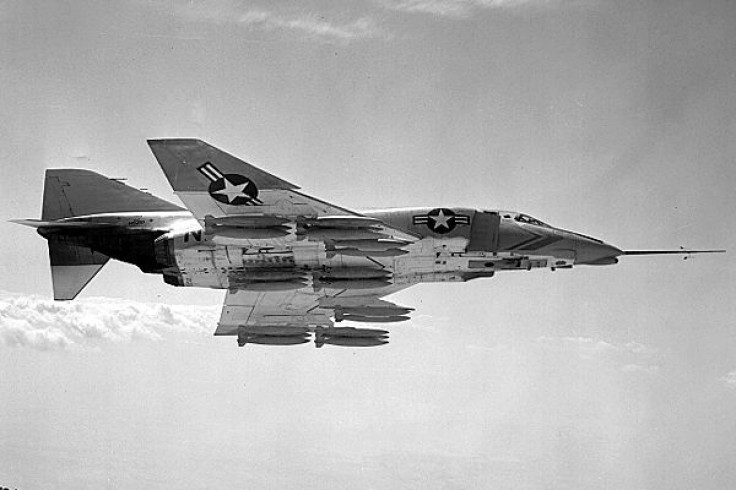Two Israeli Arms Dealers Allegedly Arrested For Smuggling F-4 Phantom Spare Parts To Iran

Two Israeli arms dealers were reportedly arrested Thursday following earlier reports that Greek authorities intercepted Israeli arms shipment intended for Iran.
Israeli media are reporting that Avihai Weinstein and Eli Cohen are currently in custody for allegedly shipping spare parts for the U.S.-made F-4 Phantom aircraft to Iran.
The alleged arrest that Israeli security forces are neither confirming or denying came after Kathimerini, a Greek daily, reported on a two-part secret investigation that took place in December 2012 and then again in April 2013, by the U.S Homeland Security Department and Greece’s Financial Crimes Squad.
This was not the first time Weinstein and Cohen have been investigated for selling arms to Iran. In 2002, Haaretz, an Israeli daily, reported that another shipment of spare parts for armored personnel carriers was seized in Germany with Thailand listed as its final destination. But German authorities found that the shipment was really destined for Iran.
In 2004, both again were suspected of selling Hawk missiles and Phantom spare parts to Iran. The Israeli Defense Ministry investigation found that it was an Israeli company that had the export licenses, which was owned by Weinstein and Cohen. But they were not indicted because as Haaretz reports, “the prosecution encountered difficulties with the evidence against them.”
In terms of the U.S. investigation into the alleged arms shipment, a spokesperson for Homeland Security Investigations (HSI) office of international affairs, declined to comment.
“We don’t confirm or deny the existence of an investigation,” Nicole Nazas told International Business Times.
Iran still has a fleet of U.S.-made, aging F-4 aircraft it bought in the 1970s. The U.S. imposed an arms embargo on Iran after the 1979 Islamic revolution; the embargo made it illegal to sell any military hardware to Iran, especially U.S.-made. The F-4 first went into service in the 1960s and is still in use by several air forces around the world; Israel phased it out of service recently. The Phantom would not have been a threat to Israel's advanced air force, which has one of the biggest fleets of Boeing Co. (NYSE:BA) F-15 and F-16 fighter-bombers in the world.
Kathimerini, which claims it had access to the secret police probe, said the shipment had originated from an Israeli town, Binyamina-Giv’at Ada, 30 miles south of the Mediterranean port of Haifa. The shipment was sent via a Greek ghost company registered under the name Tassos Karras SA in Votanikos, near central Athens.
Israeli officials declined to comment Sunday, but Israel’s Channel 2 news reported that the U.S. was aware of shipments “in real time” and relayed the message to Israeli officials, as reported by the Times of Israel.
Before the 1979 Iranian revolution, Iran was the world’s biggest buyer of Israeli arms, but after the Shah was deposed in 1979, Iran's new regime called for the destruction of Israel. But this did not stop Israeli arms dealers from continuing to supply Tehran with military goods.
In 1980, Israel made its first arms sales to the new Islamic government of Iran -- a sale that happened to include spare parts for the F-4. Later that year, Israel also sold parts for U.S.-made tanks, according to the "Historical Dictionary of Israeli Intelligence."
In 1981, Ya’acov Nimrodi, an Israeli businessman and arms dealer, signed a deal with Iran’s Ministry of National Defense to sell Iran arms worth approximately $136 million, which included Lance missiles, Copperhead shells and Hawk missiles.
In 1985, in a secret agreement between the U.S. and the Israeli Defense Ministry, a plan was devised to provide Iran with LAU anti-tank missiles and Hawk anti-aircraft missiles in exchange for Iran to pressure its proxy Hizbullah in Southern Lebanon to release U.S. and Western hostages kidnapped by the Shiite radicals. This deal was part of what became known as the Iran–Contra affair, also referred to as Irangate.
© Copyright IBTimes 2024. All rights reserved.












